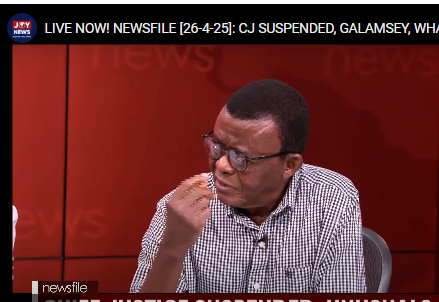Former UN Senior Governance Advisor, Professor Baffour Agyeman-Duah, has called for serious introspection regarding the handling of petitions aimed at removing the Chief Justice.
His comments come in the wake of the Chief Justice's suspension by President John Dramani Mahama, a move that has sparked widespread public and political discourse.
Speaking on JoyNews’ Newsfile programme, Professor Agyeman-Duah expressed concern over how such actions affect the principle of separation of powers.
“In a democracy, the last thing you want is for the Executive to behave in a manner that undermines another arm of government,” he said, adding that historical examples show that presidents have often acted cautiously when displeased with Chief Justices.
He pointed out that, historically, there have been moments when presidents were displeased with Chief Justices. “However, even in such cases, those leaders acted with caution,” he said.
Professor Agyeman-Duah noted, “Presidents have been mindful of this and restrained themselves from taking steps that could compromise the judiciary’s independence.”
He further emphasised the importance of respecting the constitution.
“The constitution provides a clear process for handling such matters, and that process must be followed,” he said. He commended Inusah Fuseni’s presentation on the matter, praising how it rightly highlighted the importance of adhering to constitutional procedures.
However, he also explained that while the process must be followed, the president has some discretion. He recalled an incident during former President Akufo-Addo’s tenure when a petition was submitted.
“In that case, the president, in consultation with the Council of State, determined there was no prima facie case and declined to proceed,” he said. “That was a valid approach that upheld the separation of powers without initiating formal proceedings.”
In contrast, he noted that the current president has chosen to take a different path by moving the petition forward, because you cannot fault him because he is following the process."
“While this is still in line with constitutional procedure, the president could have exercised discretion, as others have done in the past, and concluded that the petition did not merit further action,” he stated.
He concluded by urging a broader reflection on how such petitions are treated, especially given the delicate balance of power in a democratic system.
“We need to reflect on how such petitions are handled to ensure the integrity of our democratic institutions,” he said.
Latest Stories
-
‘There has been contact’ – NSA boss confirms talks with Vybz Kartel over possible Accra Sports Stadium concert
9 minutes -
GRA shines at 45th Commonwealth Tax Administrators Conference in Papua New Guinea
25 minutes -
NPP race: David Asante declares support for Bryan Acheampong
32 minutes -
The Luckiest *712# to participate in JoySports Invitational Tournament 2025
1 hour -
National Boardroom Summit launched to strengthen governance and drive institutional growth
1 hour -
CBG nurturing future leaders with a flagship literacy initiative
2 hours -
Global Media Alliance, Japan Motors mark 15 years of Corporate Run & Walk
2 hours -
Lawyer petitions Mahama for Commission of Enquiry into Ablekuma North rerun violence
2 hours -
Cowbell Coffee launches national promo to reward loyal customers
2 hours -
OSP charges ex-NPA boss and others in GH¢280m extortion and money laundering scandal
3 hours -
Government will restore Bawku Naba Statue – Defence Minister Omane Boamah
3 hours -
Competition Law as a catalyst for Ghana’s 24-Hour Economy and export ambitions
3 hours -
Why brands must build a consistent PR voice long before crisis hits
3 hours -
Fidelity Bank, MobileMoney Ltd and JUMO align to boost financial inclusion with launch of BoseaLoan
3 hours -
We performed, but they didn’t vote – Freddie Blay blames NPP grassroots for 2024 setback
3 hours

